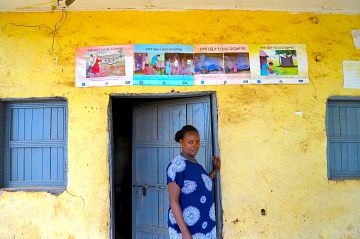Gender-related issues prevent people from seeking treatment for NTDs, Malaria Consortium-led research reveals
13 December 2019
Women and men both face gender-related challenges in getting treated for neglected tropical diseases in Ethiopia, a new article in the PLOS Neglected Tropical Diseases journal reveals.
Around the world, women and girls suffer a greater burden of neglected tropical diseases (NTDs) compared to men. Through a series of focus groups and interviews, the researchers of this new report – from Malaria Consortium and other partners – probed exactly why women in Ethiopia might not seek care, or might delay seeking care for NTDs. They also looked into gender-related challenges men might face when accessing care for NTDs.
Despite known gender-specific differences in terms of prevalence, transmission and exposure to NTDs, there is limited research on the influence of gender on NTD programmes and interventions. Differences in prevalence have often been attributed to biological vulnerability, gender roles and disproportionate poverty, illiteracy, lower education and social status.
For this article, the researchers carried out 20 interviews with four focus groups in southern Ethiopia where five NTDs – lymphatic filariasis, podoconiosis, schistosomiasis, soil-transmitted helminth infection and trachoma – are present. Participants were purposefully diverse, and included community members, volunteer Health Development Army leaders, Health Extension Workers and a range of health workers at the health post, health centre and hospital level.
The health workers reaffirmed that women face additional challenges in seeking care, and more often access healthcare services at later stages of disease. Talking about, or seeking care for, diseases affecting the genitals and breasts is considered socially taboo, and participants suggested that women were especially likely to hide these diseases.
Power dynamics, such as the economic dependence on men to pay for health services and the threat of violence if women disclose symptoms, were also present. Men, on the other hand, may delay seeking care if they are affected by scrotal swelling.
“The results demonstrate that gender is significant in health seeking for NTDs,” the researchers say. “These findings can be useful for informing programme design towards ensuring the promotion of equitable implementation.”
The authors outlined steps on how NTD treatment could be integrated into primary healthcare to address these gender-related challenges, including education initiatives and the use of safe, private areas for health services.
The report was written by staff from Malaria Consortium, the Nuffield Centre for International Health & Development at the University of Leeds, and the Regional Health Bureau in Hawassa, Ethiopia. It is based on research carried out as part of COMDIS-HSD, a Research Programme Consortium funded by the UK Government.
The full report is available online here: http://journals.plos.org/plosntds/article?id=10.1371/journal.pntd.0007840
Broader findings from this study on integrating management of NTDs into primary healthcare have been published in a research brief available on Malaria Consortium’s website.
Latest news
- International summit calls for AMR accountability in public health interventions21st March 2024
- Global SMC community celebrates new milestone at SMC Alliance Annual Meeting in Nigeria6th March 2024
- Scaling up key interventions could halve pneumonia-related childhood mortality13th February 2024
- Malaria Consortium and eGov Foundation join Mozambique’s national malaria programme to digitalise seasonal malaria chemoprevention campaigns8th February 2024
- World’s first malaria vaccine rollout launched in Cameroon22nd January 2024
- Digital solutions driving equitable access to health6th December 2023